Forest Whitaker Vantage Point Interview
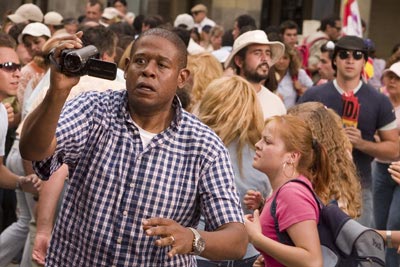
FOREST WHITAKER: POST OSCAR HIGH
EXCLUSIVE Interview by Paul FischerForest Whitaker's career took something of a notch up a year ago when he won the Best Acror Oscar for his tour-de-force performance in Last King of Scotland. Having already won raves for his performance as the obsessive cop in The Shield, Whitaker is at the pefect point in his career. This quiet, modest actor is on a roll. Next seen in the thriller Vantage Point, in which he plays a tourist vacationing in Spain who bears witness to an assassination, Whitaker explined to Paul Fischer about the choices he makes, and of courser the Oscars.
Paul Fischer: Vantage Point is an interesting choice for you to do because it's very different from what you normally do. And I imagine it must be very difficult to get under the skin of this particular guy. What was the attraction?
Forest Whitaker: Well, I mean, first, this was before The Last King, too came out, you know? But there's a number of things. It's like, this guy is Everyman. I'm always trying to find the heroic in the normal and the ordinary and I felt like this character, who is divorcing his wife. He's lost. He's got kids who are being left behind. He's trying to find himself, you know? Doesn't think of himself as having anything to offer, or anything like that and slowly starts to discover what he's made of, in a way. I don't think he ever thinks of himself as a hero, but in the end, he's willing to do the right thing and realizes what's most important to him, which is those that he loves, his family and his kids. To me, that's a very important - little - nice little statement side of this movie that's this Rashomon kind of reenactment.
Paul Fischer: What were the acting challenges for you when there were different vantage points, and did you know in advance what the vantage point was going to be before you saw it? The different reinterpretations of the same scene?
Forest Whitaker: Yeah, you kind of know that they're switching to a different thing, but I played it the same way all the time, because there's a consistency. He's not a character that one person sees as evil and one person sees as good, so I don't have to shift my behavior because of that..
Paul Fischer: Is this a political thriller, or just a much more straightforward action thriller? Do you see this as being a film about politics at all?
Forest Whitaker: I think it's an action thriller. But I think that the thing that's political about it is just the notion of looking at something from all different points of view. I think we have to keep in mind that we need to be able to see from everybody's perspective what's actually occurring and that's the way we'll find tolerance in the world, and that's the way we'll be able to move forward. Otherwise, I think that some of the other things, which - maybe will make you have conversation, but they're not deeply rooted inside of the film. They're not explored.
Paul Fischer: The thing that always struck me about you in the years that we've known each other and have been doing this is your genuine humility, which is so refreshing in this town. I was wondering when the awards season occurs and you have to deal with presumably a lot of nonsense, how do you deal with that? And how are you able to sort of keep it all in perspective when you won everything last year.
Forest Whitaker: I think it was so new, in a way. Not the winning, because I've won at the Cannes Film Festival, things like that. Obviously not these awards, but - Academy Award. But - I was trying to allow myself to experience each moment and I think I was more concerned with that than the outcome of each one, you know? And so as a result, probably - it stayed fresher for me than for others. You know what I mean? Like, I remember, like, what people said to me when I walked because I was present. And there was also a learning curve for me, too, as a person, because I was trying to allow myself to celebrate things. But for me - it's not that I don't put things down. But I don't have, like, posters in my house, or things like - I don't have any of those things.
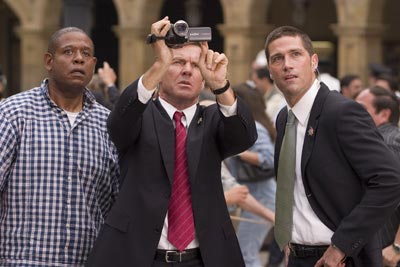 Paul Fischer: Really?
Paul Fischer: Really?Forest Whitaker: No, I don't have one poster.
Paul Fischer: Of any of your work?
Forest Whitaker: No.
Paul Fischer: Even the ones that you directed?
Forest Whitaker: No. But I used to have a poster of what I directed in my office. Like, the one thing I'd have in my office when I used to have my company was that, the three movie posters of what I directed was in the company conference room, you know? I mean, I think there's something about that that's not great, either, you know what I mean? You know. It's - I mean, as a kid coming up, I think for me, was more about - humility was applauded, you know? So. It's something that I - it's ingrained in my being, I think. You know what I mean?
Paul Fischer: Did the Oscar do anything for you in terms validating your work? Or do you think that it's symbol of where you've come? Where you've gone to, and where you've come from as an actor?
FForest Whitaker: I think it's a little bit of both, but in a different way than, like, raising of the mantle. Because when I worked on Last King, I did everything I could. I mean, I committed myself completely to working on the character. And I hadn't worked in a long time like, five years and I remember leaving, and everybody said, "Well, what do you think?" I said, "Well, if it doesn't work, then there's nothing else I can do," you know? And that was it. And so for me, for people to embrace it, it was great. You know? Because I gave everything I could and I didn't know.
Paul Fischer: Now as a recipient of last year's award, you have to present the Best Actress this year.
Forest Whitaker: Yeah.
Paul Fischer: Have they told you in the light of the writer's strike what contingency plans are for the ceremony?
Forest Whitaker: They haven't said anything to me. I think they must know that the strike's gonna be over, because they've been going forward pretty positively.
Paul Fischer: Are you nervous about doing that? Are you nervous about being a presenter?
Forest Whitaker: A little bit.
Paul Fischer: It's a cool thing, though.
Forest Whitaker: Yeah, no, it's nice. You know? And the actresses are all so talented, you know? I'm not jaded about that at all, man. I think it's a great thing, you know? And that was another thing about last year. It's like, I felt so much support. Like, even from the other artists who were in my category, they were really so positive about - us together, and my work and stuff. So it gave you a good feeling.
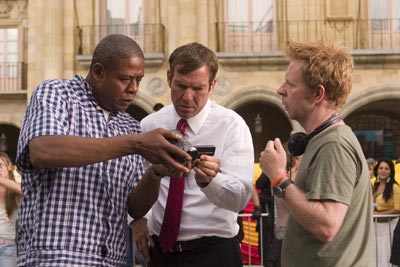 Paul Fischer: So you hadn't worked for a while before you did King of Scotland. Now I presume you're a little bit busier now. What kinds of stuff are you looking at doing now?
Paul Fischer: So you hadn't worked for a while before you did King of Scotland. Now I presume you're a little bit busier now. What kinds of stuff are you looking at doing now?Forest Whitaker: Well, I'm gonna go do this movie in - called Patriots in New Orleans. It's a true story about a coach who - during Katrina, teams were dispersed, and people were dispersed all over the place. And this one coach brought together these guys from different places to form this team. And they went to the national, and they won the championship. And it's about that story. It's about how these people tried to hold together their lives.
Paul Fischer: Are you a sports fan?
Forest Whitaker: Kind of. I mean I don't follow things really deeply. I, like, watch sometimes just for fun, and I watch the end. Like, play off some stuff. This - you know, for basketball - I go to the games sometimes, but just because I'd enjoy the games, not because I've been following along through the whole season. And football, the same when we get towards the play-off season.
Paul Fischer: What about directing again?
Forest Whitaker: Maybe next year.
Paul Fischer: You have something in mind?
Forest Whitaker: I don't have a script, but it's just like - this idea I had about this journalist who goes into this place to interview this sort of messiac sort of character who has this army of children soldiers. It's called Better Angels. And it's really about when you step in, and when you're responsible, you know? And this one character doesn't feel responsible at all and ultimately, sacrifices himself because of something that he learns.
Paul Fischer: Why did you take so long to get back to work after - you know, between King of Scotland came along?
Forest Whitaker: I produced a movie, and I was developing - I was in pre-production to shoot one. Didn't happen. Then I stepped into another one, and I directed it. And so by that time, it was just like - took a long time.
Paul Fischer: Did doing King of Scotland refuel your desire and your need to be an actor again?
Forest Whitaker: Yeah, it did. I mean, it - it made me think that I was, like, on the cusp of learning how to do something that - you know, to become better artists, you know? A better actor. And I wanted to keep exploring it. So I've been, like, trying to explore it. And it's like - it's such a confusing process for me, you know. Because like - I feel like I got this, and - I mean, okay. Let me, like, solidify this. And then all of a sudden you think, "Well, maybe you're working too hard over there doing it like that. You need to try it like this." You know what I mean? Without doing that. So then you end up doing something like this, you know what I mean? Then you see, "Well, I don't know. You didn't feel that thing." So then you go, and you go do, like, you know, Street Kings. That's the next one I got coming out.
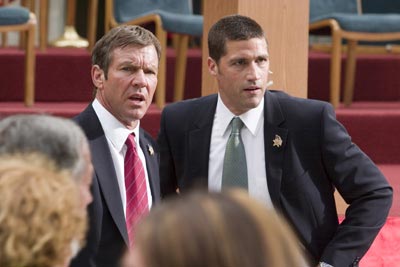 Paul Fischer: What is that?
Paul Fischer: What is that?Forest Whitaker: It's a movie about police corruption in Los Angeles.
Paul Fischer: Another thing about police corruption? Are you corrupt this time, or are you the -
Forest Whitaker: Yeah. I play, like, the - kind of like, almost like the godfather of, like, the corrupt cops in Los-LAPD.
Paul Fischer: We don't get to see the dark side of you very often.
Forest Whitaker: This was kind of cool.
Paul Fischer: What do you tap into to bring out the dark side of you?
Forest Whitaker: I - have duality, too. I've got things that are dark. But I think - now I realize that I don't even have to have those things in me. I can just, like, imagine them enough, and they come inside.
Paul Fischer: Oh, really?
Forest Whitaker: Yeah. I don't think - I feel like you can access anything now. You know? Like, anything you could do.
Paul Fischer: Do you talk to any cops in preparation for that?
Forest Whitaker: I've played so many cops before. I mean, I had been - you know, yeah. I mean, I read some books and went through a couple of things. And - we went to a shooting range. But I've been to so many shooting ranges, played so many cops. You know. And it's not like - it's not like they're gonna be able to, like, get deep into the corruption part of it, you know? It's a hard core film. I just saw it two days ago.
Paul Fischer: Is it tough?
Forest Whitaker: Oh, yeah. Keanu's really, really excellent in it. He plays, like, the enforcer. He's like, my guy I send out to - to destroy people and stuff. and ultimately it's about his awakening.
Paul Fischer: So there are no really good characters in this. Although he develops into a -
Forest Whitaker: You know what's interesting? I don't know if he develops into a good character. But his eyes are open. But even once his eyes are opened, he realizes that his eyes have been closed. Even when he, like, is opening his eyes to me, he realizes at the end that his eyes have been closed to the person who's against me. You know?
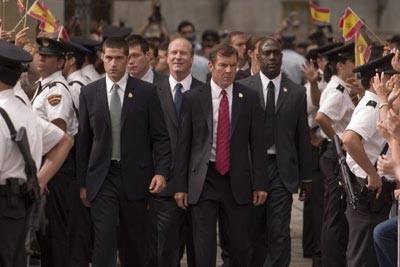 Paul Fischer: Bill Hurt says there's no such thing really as straight good and evil. That they're all characters.
Paul Fischer: Bill Hurt says there's no such thing really as straight good and evil. That they're all characters. Forest Whitaker: What did he say?
Paul Fischer: There's no sort of bad - good and bad. That it's conflicted. He used the word conflicted a lot.
Forest Whitaker: Yeah. I agree with him. Because I think that even the character I played in Street Kings, he really feels like he's doing something good for the people around him. Like, at the end, he's - it's this long conversation with Keanu where he's like, saying to him, he says, "What do you think is gonna - who's paying for - you know, this guy's surgery? Who's paying for his retirement? Who's - you know. Who wouldn't do this? Take care of the people they love?"
Order Now from Chaos
Order Now from Sanity
MORE
- Viggo Mortensen The Road
- 24 Cast Reunion
- Aaron Eckhardt No Reservations
- Aaron Eckhart The Dark Knight
- Adam McKay Step Brothers Interview
- Alan Alda Diminished Capacity Interview
- Alan Alda Diminished Capacity Interview
- Alex Dimitriades
- Al Pacino Oceans 13
- Alan Rickman Snow Cake
- Alan Rickman Sweeney Todd



